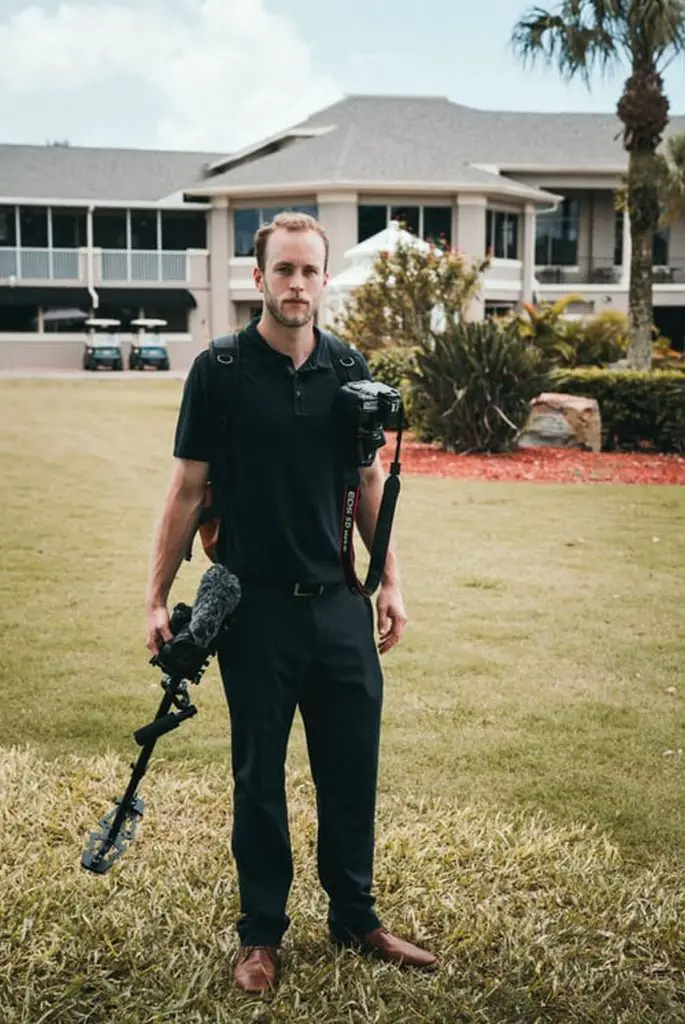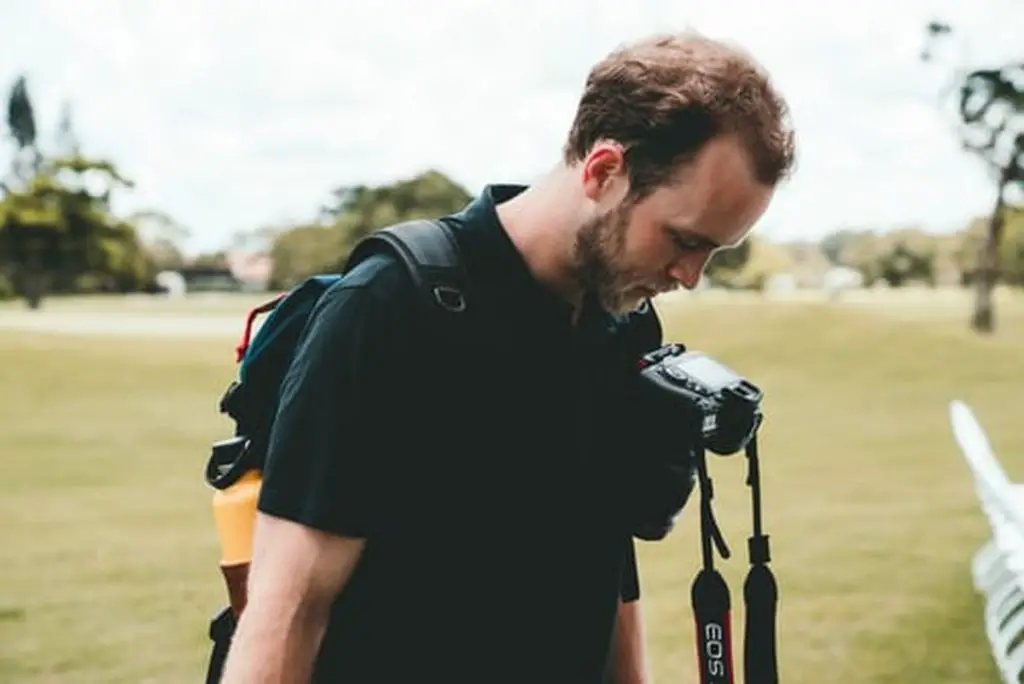Capturing a wedding through videography preserves the visuals, emotions, sounds, and stories that make the day unforgettable.
Unlike photos, a wedding video lets couples relive their day with all the movement and sounds that define those moments, from vows to laughter-filled toasts.
A good videographer focuses on capturing key moments, producing clear audio, and compellingly telling the wedding story through a high-quality film.
Suppose you’re considering adding videography to your plans. In that case, this guide covers essential responsibilities, benefits, and tips to help you choose the right professional who matches your style and vision, ensuring your wedding day is beautifully preserved for years.
Let’s get straight to the point
Hiring a wedding videographer preserves your day’s emotions, sounds, and special moments in a way photos can’t. A skilled videographer captures key moments and clear audio and produces a high-quality video that tells your unique story.
While videography may impact your budget and require coordination with other vendors, it creates an heirloom you can share with future generations.
To find the right professional, review portfolios, discuss style and budget, and ensure they have technical skills suited to your venue.
These tips will help you choose a videographer who will capture and preserve your memories beautifully.
Responsibilities Of A Wedding Videographer

1. Capturing Key Moments
A wedding videographer’s primary role is to ensure that all the significant moments of the event are recorded in a way that tells a cohesive and compelling story. They must be attentive and capture planned events and spontaneous, heartfelt daily interactions.
- Preparation and Anticipation: Videographers need to understand the sequence of events to anticipate each critical moment, from the walk down the aisle to the first kiss as a married couple.
- Technical Skills: They use high-quality equipment to capture clear visuals, manage lighting adjustments, and ensure smooth camera movement, especially in dynamic settings.
- Attention to Detail: In addition to major moments, they record smaller, intimate gestures, like a father’s proud smile or friends laughing, adding richness and emotional depth to the final film.
2. Audio Recording
Clear audio is essential to capturing vows, speeches, and heartfelt words that make the wedding personal and memorable. Professional videographers use specialised audio equipment to ensure the couple can hear and relive these words for years.
- Microphone Use: Lapel or handheld microphones are often used for vows and speeches to ensure clarity without interference.
- Ambient Sound: They balance the need for background sounds, such as applause, with primary audio to create a layered auditory experience.
- Post-Production Sound Quality: In editing, they fine-tune audio levels, remove background noise, and ensure a crisp, clear final sound, enhancing the video’s overall emotional impact.
3. Editing And Production
After the event, videographers dedicate time to edit the footage into a polished, high-quality video that reflects the tone and spirit of the wedding. This often includes a variety of formats to give the couple different ways to relive their day.
- Highlight Reel Creation: A short, edited version that captures the most emotional and impactful moments, often set to music, for easy sharing with friends and family.
- Full-Length Video Production: This is a comprehensive video that includes the ceremony, reception, and all key events, allowing the couple to watch their day from start to finish.
- Social Media Trailer: Some videographers create a brief, captivating trailer that is perfect for sharing on social media. This allows the couple to give a sneak peek of their special day.
4. Coordination With Other Vendors
To ensure a smooth day, videographers work closely with other vendors, including photographers, event planners, and sound technicians, to avoid conflicts and ensure comprehensive coverage.
- Collaboration with Photographers: Videographers and photographers often cover the same moments from different perspectives, so communication is key to avoiding obstructive angles.
- Coordination with Event Planners: Staying in sync with the wedding planner ensures that the videographer knows the timing and order of events to avoid any missed moments.
- Adaptability: By coordinating with all key players, the videographer can adapt their approach to capture the best footage without disrupting the flow of the day.
Why Choose A Wedding Videographer?
Choosing to have a videographer means investing in a comprehensive record of your wedding, preserving moments that can be enjoyed for years.
By capturing motion, sound, and atmosphere, videographers add another layer of depth to your wedding memories.
Pros And Cons Of Hiring A Wedding Videographer
Before hiring a videographer, consider the benefits and drawbacks to decide what best fits your needs and budget.
Pros Of Hiring A Wedding Videographer
- Emotional Replay: Video captures the day’s energy, sound, and spirit in a way that photos alone cannot. You can revisit the experience and emotions anytime you watch.
- Complete Storytelling: While photography captures single frames, video captures sequences-allowing you to relive events as they happened.
- Inclusion of Absent Guests: Sharing a video lets loved ones who couldn’t attend experience the day as if they were there.
- Heirloom for Future Generations: A wedding video offers a keepsake that future children and relatives can watch, preserving your family’s history.
Cons Of Hiring A Wedding Videographer
- Budget Impact: Adding videography to your budget can be a significant expense, especially alongside photography.
- Coordination: Managing multiple vendors (such as photographers and videographers) can require extra planning.
- Editing Timeline: Video editing can be time-consuming, so couples should be prepared for a potential waiting period after the wedding.
- Potential Distractions: Additional cameras and equipment can feel intrusive to some, especially during intimate moments.
Tips For Hiring The Right Wedding Videographer

To get the best results, choosing a videographer who matches your style and understands your vision is essential. Here are some tips to help you find the right professional for the job.
1. Research And Review Portfolios
Look through each videographer’s portfolio to understand their style and approach.
- Do they focus on storytelling or cinematic elements?
- Are their videos emotionally resonant and professionally edited?
- Check for clear audio and well-composed shots.
2. Define Your Budget And Priorities
Establish a clear budget and decide what aspects of the video are most important to you
- Highlight reels versus full-length films
- Social media clips or extra services like pre-wedding interviews
- Consider which elements you need to scale back or include based on your budget.
3. Meet In Person Or Over Video Call
Meet with potential videographers to discuss their style, previous work, and packages. A conversation helps establish a personal connection, ensuring they understand your expectations and that you feel comfortable with them.
- Ask about their filming approach and any additional services they offer.
- Ensure they’re flexible and can coordinate seamlessly with your other vendors.
4. Read Reviews And Ask For References
Reviews and referrals from previous clients can provide insight into their professionalism and reliability.
- Look for positive feedback regarding quality, communication, and delivery timelines.
- Ask for samples of full wedding videos (not just highlights) to see the quality throughout.
5. Confirm Equipment And Technical Skills
Make sure your videographer is prepared for your specific venue and has the technical knowledge required:
- Lighting and Audio: Ask if they bring additional lighting and professional microphones.
- Backup Equipment: Ensure they have backup cameras and gear in case of technical issues.
Essential Questions To Ask A Wedding Videographer
To get a complete picture, ask these essential questions before finalising a videographer:
- What Packages Do You Offer?
- Ask about the standard package inclusions and available add-ons.
- How Long Will the Editing Process Take?
- Find out how soon after the wedding you can expect the video.
- Do You Offer Customisation?
- Inquire if you can tailor the package to fit your unique needs.
- Can We Select the Music?
- Many videographers allow couples to choose specific songs for certain segments.
- Do You Work Alone or with an Assistant?
- Knowing how many people will be there is helpful for planning.
Conclusion
Hiring a wedding videographer is a valuable investment in preserving your special day’s memories, emotions, and sounds.
From capturing key moments and ensuring clear audio to producing a polished highlight reel or full-length video, a skilled videographer adds depth and life to the memories that photos alone cannot capture.
While it may add to the budget and require additional coordination, the result is a lasting heirloom that lets you relive your wedding day and share it with future generations.
When choosing the right professional, prioritise style, technical expertise, and seamless coordination with other vendors to ensure a smooth experience.
By following the tips outlined in this guide, you’ll be well-equipped to find a videographer who understands your vision and delivers a beautiful, high-quality film that reflects the joy and love of your wedding day for years to come.

